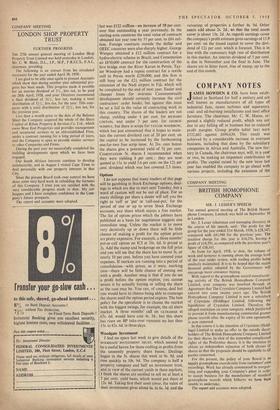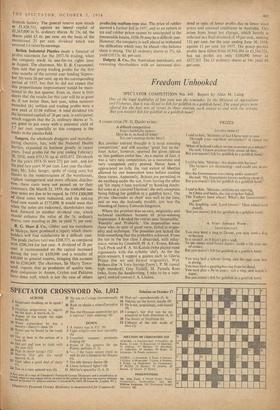COMPANY NOTES
JAMES HOWDEN & CO. have been estab- lished in Scotland for half a century and are well known as manufacturers of all types of industrial fans, steam turbines and separators, coal- and oil-burning installations and steel office furniture. The chairman, Mr. C. W. Hume, re- ported a slightly reduced profit, which was not due to any falling off in business but to reduced profit margins. Group profits (after tax) were £532,602 against £690,630. This result was achieved by a considerable increase in overseas business, including that done by the subsidiary companies in Africa and Australia. The new fac- tory in Canada, the chairman says, will, in a year or two, be making an important contribution to profits. The capital raised by the new issue last year has enabled the company to go ahead with various projects, including the extension of the Scottish factory. The general reserve now stands at £1,928,513, against an issued capital of £1,365,000 in 5s. ordinary shares. At 23s. 6d. the shares yield £5 6s. per cent, on the basis of the maintained 25 per cent. dividend which was covered 3.6 times by earnings.
British Industrial Plastics made a forecast of profits statement for the 1957-58 trading, when the company made its one-for-six rights issue In August. The chairman, Mr. E. R. Crammond, then said that group trading, profits for the first nine months of the current year (ending Septem- ber 30) were 20 per cent. up on the corresponding period of 1957, but that he did not expect that this proportionate improvement would be main- tained in the last quarter. Even so, there is little doubt that the results for this year will be as good as, if not better than, last year, when turnover exceeded £6-1 million and trading profits were a new peak at £1.06 million. A total dividend (on the increased capital) of 20 per cent. is anticipated, which suggests that the 2s. ordinary shares at 7s. are good to put away with a potential yield of 5.7 per cent, especially as this company is the leader in the plastics field.
Sangers, the wholesale druggists and manufac- turing chemists, has, with' the National Health SerVice, expanded its business greatly in recent years. Total profits for the year ending February 28, 1958, were £59,136 up at £643,852. Dividends for the years 1954-56 were 27f per cent., and for the past two years 30 per cent. Last year the chair- man, Mr. John Sanger, spoke of rising costs but thanks to the modernisation of the warehouses, vigilant management and more efficient distribu- tion, these costs were not passed on to their customers. On March 31, 1959, the £400,000 ten- year notes are due to be repaid. In 1954 £100,000 of these notes were redeemed, and the sinking fund now stands at £175,000. It would seem that when the notes are redeemed, shareholders may look forward to another dividend rise, which should enhance the value of the 5s. ordinary shares, now standing at 20s. to yield 71 per cent.
R. G. Shaw & Co., rubber and tea merchants to Malaya, have produced a report which share- holders will find satisfactory in a difficult year. The profit (before tax) was £208,575, as compared with £206,344 for last year. A dividend of 20 per Cent, is recommended on the capital increased during the year to £420,000 and a transfer of £40,000 to general reserve, bringing this account I1P to £260,000. The chairman, Sir Harry Town- send, reports that as producers of quality teas, their companies in Assam, Ceylon and Pakistan have done well, which is not the case of others producing medium-type teas. The price of rubber showed a further fall in1957, and as an upturn in tea and rubber prices cannot be anticipated in the foreseeable future, 1958-59 may be a difficult year. However, the company is well placed to withstand the difficulties which may lie ahead—the balance sheet is strong. The £1 ordinary shares at 37s. 6d. yield £10 13s. 4d. per cent.
Dalgety & Co., the Australian merchants, are rewarding shareholders with an increased divi-
dend in spite of lower profits due to lower wool prices and seasonal conditions in, Australia. This arises from lower tax charges, which benefit is reflected in a final dividend of 10 per cent., making 13+ per cent, for the year ending June 30, 1958, against 12 per cent. for 1957. The group pre-tax profits have fallen from £1,941,404 to £1,516,521, but net profits are only £100,000 lower at £827.563. The f.:1 ordinary shares at 34s. yield £8 per cent.



















































 Previous page
Previous page